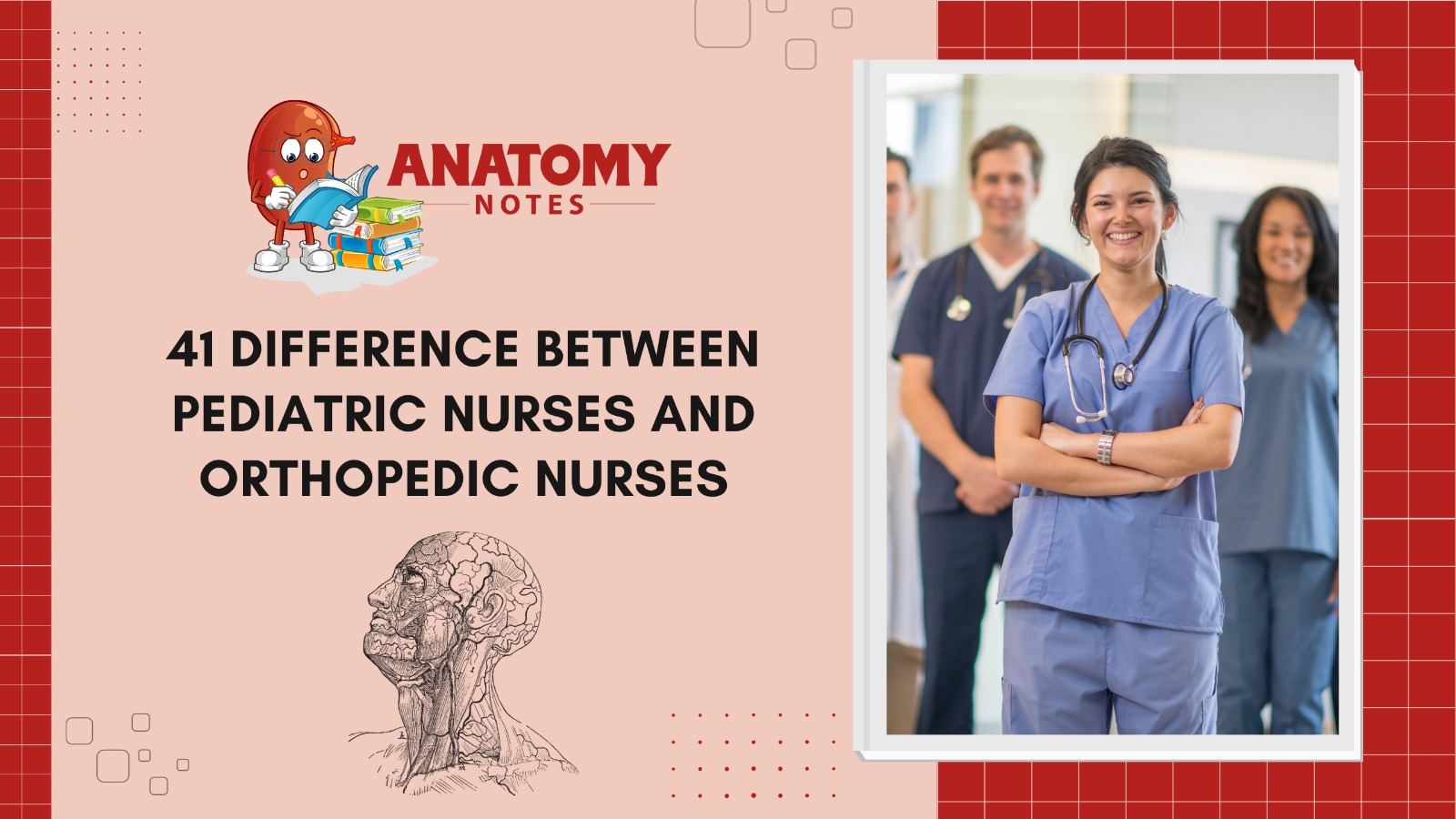Although pediatric and orthopedic nurses specialize in various patient care areas, they are vital to the healthcare system. These nursing professions have very different patient demographics, medical conditions, and care abilities. Pediatric nurses treat infants through teenagers. They specialize in pediatric growth and development and can address infant healthcare needs. Pediatric wards, NICUs, and clinics employ nurses. Children and families get immunizations, developmental exams, and emotional assistance. Pediatric nurses must communicate properly to educate parents and children about proper care. This job requires patience, empathy, and care.
Orthopedic nurses handle spine, muscle, and joint issues. Rehabilitation, orthopedic, and sports medicine clinics use them. Nursing diagnoses and treats fractures, joint replacements, spinal injuries, and orthopedic surgeries. By integrating orthopedic surgeons, physical therapists, and other healthcare professionals, they provide comprehensive care. Nurses in orthopedics must know anatomy, operations, postoperative care, and rehabilitation. Children, adults, and seniors are treated.
Pediatric and orthopedic nurses commonly have BSNs and sometimes pursue certifications. Significant specialties need distinct clinical training. Pediatric nurses rotate while orthopedic nurses study and practice.
Overall, pediatric and orthopedic nurses serve distinct patients, specialize in various fields, and have different skills. Orthopedic nurses manage orthopedic issues of all ages, whereas pediatric nurses care for children and need exceptional communication and caring skills. Both nursing specialties must provide full healthcare for each patient group.
Here are 41 differences between paediatric nurses and orthopaedic nurses in a table format:
|
S.No. |
Aspects |
Pediatric Nurses |
Orthopedic Nurses |
|
1 |
Specialization |
Specialize in caring for infants, children, and adolescents |
Specialize in caring for patients with musculoskeletal conditions and injuries |
|
2 |
Patient Age Range |
Typically care for patients from birth to 18 years |
Care for patients of all ages with orthopedic issues |
|
3 |
Medical Focus |
Focus on pediatric healthcare and development |
Focus on orthopedic conditions and musculoskeletal health |
|
4 |
Education and Training |
Requires a nursing degree and specialized training in pediatrics |
Requires a nursing degree with specialized training in orthopedics |
|
5 |
Common Conditions Treated |
Childhood illnesses, growth and development, vaccinations |
Fractures, joint disorders, musculoskeletal injuries |
|
6 |
Work Settings |
Work in pediatric hospitals, clinics, schools, and pediatric offices |
Work in hospitals, orthopedic clinics, and rehabilitation centers |
|
7 |
Age-Appropriate Care |
Provide age-appropriate care and education for children |
Tailor care to patients of various ages with orthopedic conditions |
|
8 |
Growth Monitoring |
Monitor growth and development milestones |
Monitor musculoskeletal growth and healing progress |
|
9 |
Family-Centered Care |
Emphasize family involvement in patient care |
May involve family in patient education and support |
|
10 |
Play Therapy |
May incorporate play therapy to ease children’s anxiety |
Less likely to incorporate play therapy in care |
|
11 |
Developmental Assessments |
Conduct developmental assessments and screenings |
Focus on assessing musculoskeletal function and mobility |
|
12 |
Vaccination Administration |
Administer childhood vaccines and immunizations |
Typically not involved in vaccine administration |
|
13 |
Emotional Support |
Provide emotional support to children and parents |
Offer emotional support to patients with orthopedic issues |
|
14 |
Pain Management |
Specialize in pediatric pain management techniques |
Focus on pain management for orthopedic conditions |
|
15 |
Pediatric Specialties |
May work in neonatal, pediatric ICU, or pediatric oncology |
May work in orthopedic specialties like sports medicine |
|
16 |
Pediatric Medications |
Administer and monitor pediatric medications |
Administer medications related to orthopedic care |
|
17 |
Pediatric Assessment |
Assess physical and developmental health in children |
Assess musculoskeletal function and injuries |
|
18 |
Pediatric Surgery |
May be involved in pediatric surgical procedures |
May assist in orthopedic surgeries and procedures |
|
19 |
Pediatric Rehabilitation |
Help with the rehabilitation of children with various conditions |
Assist with the rehabilitation of orthopedic patients |
|
20 |
Pediatric Emergency Care |
May provide care in pediatric emergency situations |
Less likely to be involved in emergency care for orthopedic issues |
|
21 |
Pediatric Chronic Conditions |
Care for children with chronic health conditions |
Care for patients with chronic orthopedic conditions |
|
22 |
School Health |
May work in school health programs and screenings |
Less likely to be involved in school health programs |
|
23 |
Child Advocacy |
Advocate for the rights and well-being of children |
Advocate for orthopedic patients’ needs and rights |
|
24 |
Growth Chart Interpretation |
Interpret and use growth charts for assessment |
Interpret diagnostic tests and imaging for orthopedic care |
|
25 |
Weight and Nutrition Counseling |
Provide counseling on pediatric nutrition and weight management |
Focus less on nutrition counseling for orthopedic patients |
|
26 |
Pediatric Diabetes Management |
Manage diabetes care and education for pediatric patients |
Less likely to be involved in diabetes management |
|
27 |
Family Education |
Educate families on child health and development |
Educate patients and families on orthopedic conditions and care |
|
28 |
Newborn Care |
Provide care for newborns, including neonatal care |
Focus on orthopedic care, not involved in neonatal care |
|
29 |
Pediatric Psychiatry |
May collaborate with pediatric psychiatrists |
Less likely to collaborate with psychiatrists |
|
30 |
Pediatric Respiratory Care |
Assist in the care of children with respiratory conditions |
Less likely to be involved in respiratory care |
|
31 |
School Nurse Collaboration |
Collaborate with school nurses for student health |
Collaborate with other orthopedic healthcare professionals |
|
32 |
Immunization Education |
Educate parents on the importance of childhood vaccinations |
Less likely to emphasize vaccination education |
|
33 |
Pediatric Allergies |
Manage allergies and allergic reactions in children |
Less likely to be involved in allergy management |
|
34 |
Developmental Delays |
Assess and address developmental delays in children |
Less focused on developmental delays in orthopedic care |
|
35 |
Pediatric Dental Care |
May provide basic dental care and education |
Less involved in dental care for orthopedic patients |
|
36 |
Common Procedures |
Administering vaccines, assessing growth, conducting well-child checkups |
Casting, splinting, fracture care, joint assessments |
|
37 |
Child Abuse Detection |
May be trained in recognizing signs of child abuse |
Less likely to be trained in child abuse detection |
|
38 |
Adolescent Health Counseling |
Provide counseling on adolescent health and behavior |
Less likely to provide counseling in adolescent health |
|
39 |
Pediatric Cardiac Care |
May be involved in pediatric cardiac care |
Less likely to be involved in cardiac care for orthopedic patients |
|
40 |
Pediatric Mental Health |
Address pediatric mental health and behavioral issues |
Focus less on mental health issues in orthopedic care |
|
41 |
Pediatric Neurological Care |
Address pediatric neurological conditions and disorders |
Less likely to be involved in neurological care |
Also read: 43 Difference between CCU and ICU
Frequently Asked Questions (FAQ’s):
Q1. Who are pediatric nurses' main patients?
Infants, children, and adolescents are the main patients of pediatric nurses. In pediatric wards, NICUs, and clinics, they are educated to meet young kids’ medical and developmental requirements. Young patients and their families get vaccines, developmental tests, and emotional support.
Q2. What makes orthopedic nurses unique?
Orthopedic nurses treat patients with bone, muscle, and joint issues. Sports medical, orthopedic, and rehabilitation clinics use them. They examine and treat fractures, joint replacements, spinal injuries, and orthopedic procedures. Orthopedic nurses supply comprehensive treatment with orthopedic surgeons and physical therapists.
Q3. What education do pediatric and orthopedic nurses need?
A bachelor’s degree in nursing is required to become a pediatric or orthopedic nurse. Certifications or training may be needed for both specializations. Orthopedic nurses study orthopedic nursing and practical experiences, whereas pediatric nurses learn pediatric nursing through clinical rotations.
Q4. What are the necessary pediatric nursing skills?
Good pediatric nurses communicate well with children and counsel parents on correct care and treatment. For young patients and their families to feel comfortable and supported, they must be patient, empathetic, and caring.
Q5. Orthopedic nurses provide patient care, but what expertise is essential?
Orthopedic nurses examine and treat orthopedic patients. They coordinate postoperative treatment and rehabilitation with orthopedic surgeons, physical therapists, and other healthcare specialists. Patients’ musculoskeletal health and rehabilitation depend on their knowledge of anatomy, orthopedic procedures, and orthopedic-specific therapies.




